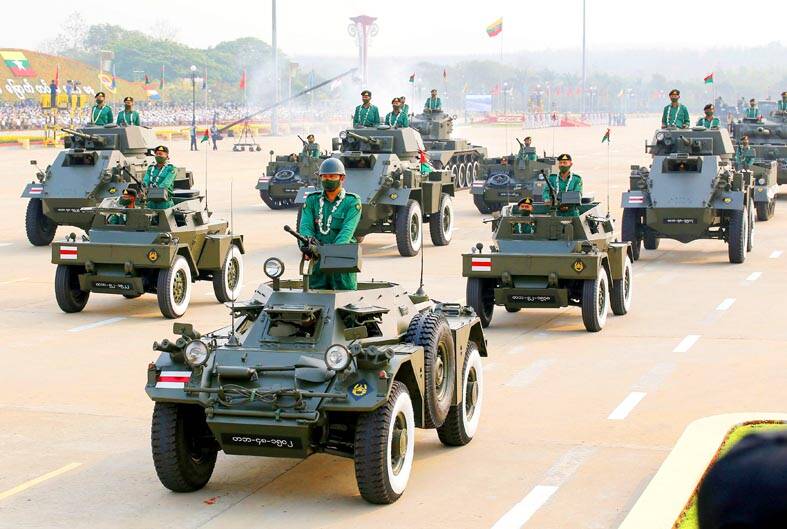Burmese security services yesterday shot down seven drones over the capital, Naypyidaw, the junta said, in what appeared to be a rare attack on its center of power.
The military’s ouster of Aung San Suu Kyi’s government in 2021 sparked renewed fighting with ethnic minority armed groups, as well as with People’s Defense Forces (PDFs) in areas previously untouched by decades of conflict in Myanmar.
The National Unity Government, dominated by lawmakers ousted in the coup who are now working to topple the junta, said it had carried out the attack with the PDF.

Photo: Reuters
Four drones approaching Naypyidaw airport and three drones approaching Zayarthiri township in the capital “were successfully shot down and destroyed,” the junta’s information team said in a statement.
There was no damage or casualties, it said.
Naypyidaw’s airport was temporarily closed after the incident at about 10am, said a source at the airport, who asked for anonymity as they were not authorized to speak to the media.
The source said that there were no casualties, adding that one of the downed drones was carrying a bomb that was later defused.
Images released by the junta’s information team purportedly of the aftermath showed a broken, fixed-wing drone lying on tarmac and a large piece of debris in a wooded area.
Local media reported that a PDF group in the area said it had launched drones at military targets in Naypyidaw.
The National Unity Government said on Facebook that the attack had targeted the military’s headquarters and a military air base in Naypyidaw, adding that “initial reports” suggested there had been casualties.
It did not provide details or say what kind of drones had been used in the attack.

Tropical Storm Gaemi strengthened into a typhoon at 2pm yesterday, and could make landfall in Yilan County tomorrow, the Central Weather Administration (CWA) said yesterday. The agency was scheduled to issue a sea warning at 11:30pm yesterday, and could issue a land warning later today. Gaemi was moving north-northwest at 4kph, carrying maximum sustained winds near its center of up to 118.8kph and gusts of 154.8kph. The circumference is forecast to reach eastern Taiwan tomorrow morning, with the center making landfall in Yilan County later that night before departing from the north coast, CWA weather forecaster Kuan Shin-ping (官欣平) said yesterday. Uncertainty remains and

SEA WARNING LIKELY: The storm, named Gaemi, could become a moderate typhoon on Wednesday or Thursday, with the Taipei City Government preparing for flooding A tropical depression east of the Philippines developed into a tropical storm named Gaemi at 2pm yesterday, and was moving toward eastern Taiwan, the Central Weather Administration (CWA) said. Gaemi could begin to affect Taiwan proper on Tuesday, lasting until Friday, and could develop into a moderate typhoon on Wednesday or Thursday, it said. A sea warning for Gaemi could be issued as early as Tuesday morning, it added. Gaemi, the third tropical storm in the Pacific Ocean this typhoon season, is projected to begin moving northwest today, and be closest to Taiwan on Wednesday or Thursday, the agency said. Today, there would likely

DISRUPTIONS: The high-speed rail is to operate as normal, while several airlines either canceled flights or announced early departures or late arrivals Schools and offices in 15 cities and counties are to be closed today due to Typhoon Gaemi, local governments announced last night. The 15 are: Taipei, New Taipei City, Taoyuan, Tainan, Keelung, Hsinchu and Kaohsiung, as well as Yilan, Hualien, Hsinchu, Miaoli, Chiayi, Pingtung, Penghu and Lienchiang counties. People should brace for torrential rainfall brought by the storm, with its center forecast to make landfall on the east coast between tonight and tomorrow morning, the Central Weather Administration (CWA) said. The agency issued a sea warning for the typhoon at 11:30pm on Monday, followed by a land warning at 11:30am yesterday. As of

CASUALTY: A 70-year-old woman was killed by a falling tree in Kaohsiung as the premier warned all government agencies to remain on high alert for the next 24 hours Schools and offices nationwide are to be closed for a second day today as Typhoon Gaemi crosses over the nation, bringing torrential rain and whipping winds. Gaemi was forecast to make landfall late last night. From Tuesday night, its outer band brought substantial rainfall and strong winds to the nation. As of 6:15pm last night, the typhoon’s center was 20km southeast of Hualien County, Central Weather Administration (CWA) data showed. It was moving at 19kph and had a radius of 250km. As of 3pm yesterday, one woman had died, while 58 people were injured, the Central Emergency Operation Center said. The 70-year-old